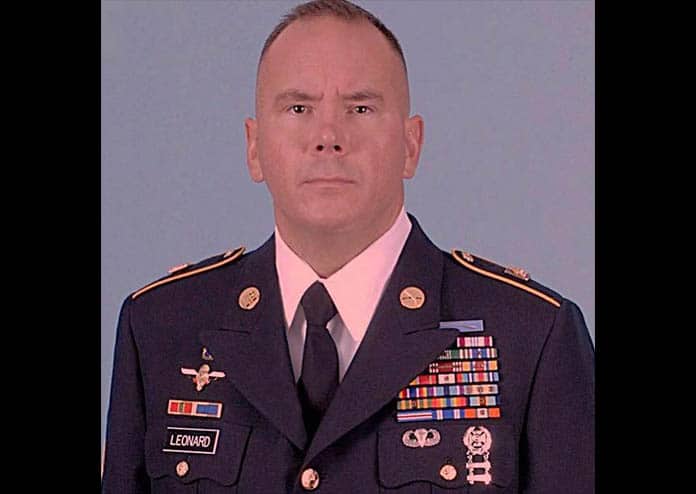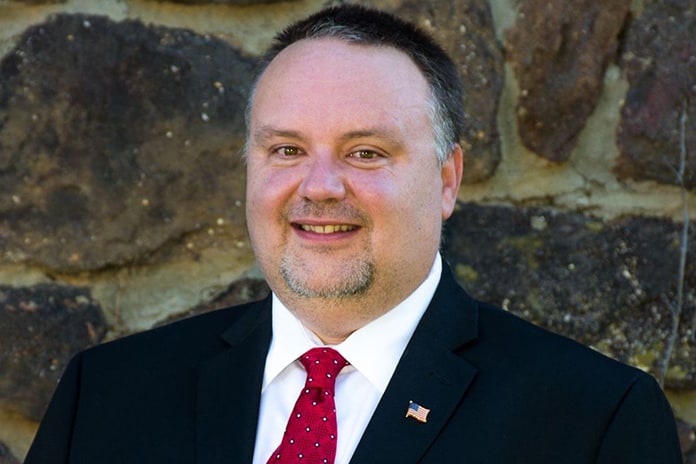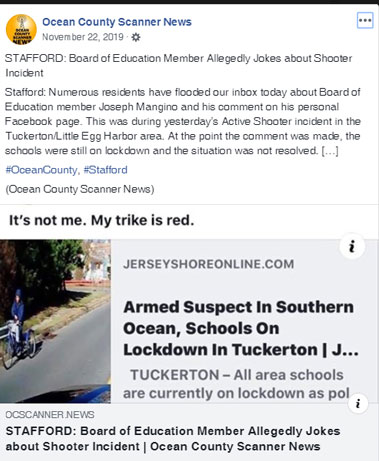
OCEAN COUNTY – No one is immune to risks of social media, even those that lead us.
Social media can be used for both the personal and professional. For example, your next door neighbor might be sharing funny animal videos to Facebook while your local police department is posting updates on road closures in your area.
While social media has become an easy and efficient way to connect with the community, it also breeds a new problem for local officials with an online presence: where does one draw the line between the personal and the professional? What sort of content should be allowed on professional platforms?
Jersey Shore Online recently used this very technology to poll the Ocean County community on this issue, asking residents via Facebook: Should politicians be held to a higher standard on social media than the average citizen?
In response, an overwhelming majority (70 voters) agreed that as public officials, they should be held to a higher standard. A small percentage (23 voters) compromised with the idea that public officials should have separate accounts for personal and professional posts, and an even smaller percentage (18 voters) believes that they should be able to post or share whatever content they choose.
One Ocean County resident noted that “as representatives they have a duty to” be professional.
Resident Michael J. Glenn said that it shouldn’t matter either way. “Why? Because unlike a lot of other things, we actually have the power to hire and fire our elected reps. All ya gotta do is vote. So they should be free to be whoever they are so we can see them for what they really are,” he wrote.
Resident Roxanne Zygmund proposed the idea that “As a professional they should have someone to review their messages before posting.”
(Zygmund noted that she is a big fan of President Trump, notorious for posting both personal and professional opinions to his social media, specifically Twitter.)
While both the average citizen and the public official have the right to free speech, the social media presence of local officials tends to be under much more scrutiny.
Over the last year in Ocean County, we have seen how significant of an impact it can have on the community when someone in a position of power posts something off-color or “unprofessional.”
Leonard’s Social Media “Bigotry”
In 2019, the Beachwood representative on the Toms River Board of Education, Dan Leonard, was under fire after posting what many called “bigoted” and “hateful” posts on Facebook regarding the Islamic community.
The New Jersey chapter of the Council on American-Islamic Relations (CAIR-NJ) called for him to resign over posts he had made in April.
One was a repost from a conservative podcaster disparaging Congresswoman Ilhan Omar, a Democrat from Minnesota. When reposting, Leonard commented “Terrorist…100%”
Another was a repost of a Fox News post about Congresswoman Rashida Tlaib, a Democrat from Michigan. Leonard commented “My life would be complete if she/they die.”
A third was a repost of a meme showing a Barbie doll with a bruise and a hijab, referring to it as “Sharia Barbie.”

“The bigoted, hateful and threatening social media posts shared by this elected board of education official serve to disqualify him for any position that has responsibility for the safety, security and well-being of New Jersey’s diverse student body,” said CAIR-NJ Executive Director James Sues at the time. “The bigoted views expressed by Mr. Leonard have no place in an educational system that seeks to celebrate diversity and encourage students of all faiths and backgrounds to excel scholastically and to make positive contributions to our society. This is just a painful reminder of the extreme divisiveness that characterizes the current political climate at the national level.”
Another civil rights group, Muslim Advocates, also called for him to step down.
“No individual who is responsible for governing the education of children should ever engage in hate speech, bigoted conspiracy theories and violent, anti-Muslim rhetoric on social media. The harmful, ugly content that Daniel Patrick Leonard regularly posts to Facebook exposes him as someone wholly unfit to work with the diverse school children in Toms River and the state of New Jersey. Leonard’s views are completely inconsistent with the New Jersey School Boards Association’s mission to promote the achievement of ‘all students,’” wrote Madihha Ahussain, special counsel for Muslim Advocates.
Janet Bamford of the NJ School Boards Association told Jersey Shore Online that a member of a board of education retains his or her free speech rights after taking office but they must make it clear that all statements made are those of an individual citizen and not those of the board.

“NJSBA strongly advises that the content of such statements reflects the principles of the Code of Ethics for School Board Members (N.J.S.A. 18A:12-24.1) and does not violate the interest of the school district and its students,” she added.
NJSBA provides officials with guidelines for how to post on social media, including:
- A board member should consider his or her responsibility to act in the interest of the school district and its students when making any type of public statement.
- Although the law allows a board member to express an opinion as an individual citizen, he or she must exercise discretion in making any public statement.
- Even though a board member is voicing an opinion as an individual citizen and uses the ethics disclaimer, he or she could still be perceived as an elected official who has more knowledge, insight and authority than an ordinary citizen.
It is even stated in the NJSBA policy on “Board Member Use of Internet Social Networks and Other Forms of Electronic Communication” that members should “refrain from inappropriate conduct in making public statements on Facebook and social networking sites, and will refrain from any disparagement of fellow board members or others on a personal, social, racial or religious basis.”
In Dan Leonard’s case, CAIR-NJ and Muslim Advocates believed that his posts did not align with NJSBA professional standards making him “unfit” to hold a position of someone who has more knowledge, insight and authority than an ordinary citizen, as the NJSBA puts it.
When asked whether he believed his personal posts reflected on his professional status, Leonard said “it’s all politics.” Leonard believes the story to be told was “not about offending people with words” but rather one about a politically motivated attack.
Inappropriate social media posts by public officials tend to carry more weight, according to the NJSBA, because they are likely to receive more credit than a message from an ordinary citizen.
Williams’ Concerning Community Comments
In addition to Board of Education members like Leonard, members of township governing bodies are under intense scrutiny as well.
For example, Stafford Township Councilman George Williams also fell under fire in August 2019 after posting controversial content in a local Facebook group.
Williams posted a meme to The Real Parents of Stafford Twp. NJ Facebook page that took a jab at the Facebook Community Standards Community. The meme was a photo of a group of young adults of various races, genders, and assumed sexual orientation.
Williams was later called out for replying to a comment on this meme. One resident posted “Where’s my sniper rifle.” Williams commented “you mean your semi fully automatic assault rifle?”

Some called the comment racist, bigoted, or inappropriate.
While the Real Parents of Stafford Twp. NJ Facebook page describes itself as “The PC free page for our town,” does this make it acceptable for someone in Williams’ position to post what many considered “inappropriate” content?
Back in August, one resident chided Williams’ for the post stating “This behavior should not occur in our community and certainly not coming from a township leader.”
Concerns regarding Williams’ social media presence extended further than just that shared post to the Stafford page. On his personal Facebook page, Williams has been known to post other memes, one of which makes a joke of the migrant crisis at the US border. This particular meme shows a photo of a border patrol van with the tagline “How to pick up Mexican girls.”
While the issue eventually blew over, other members of the township council noted at the time that they do not condone these types of posts and that Williams’ comments do not represent the remainder of the council.
A statement from Business Administrator Matthew von der Hayden read “The Township does not endorse, support or comment in any private Facebook groups…The Mayor and Township Council do not condone the posting of offensive material.”
Williams did not respond to requests for comment on the matter as of print time.
Mangino’s Facebook Faux Pas
The combination of politics and social media can be a volatile one. Those in the public eye have to be careful no matter what they post, even if it is not meant to be inappropriate or disparaging.
For example, in November 2019, Stafford Board of Education and NJ Organizing Project member Joe Mangino came under fire on Facebook for his commentary on a certain news article.
On Nov. 21, 2019, Tuckerton area schools were placed on lockdown after gunfire was exchanged at the intersection of Route 9 and North Green Street and the armed suspect fled on a bicycle. Jersey Shore Online reported that local law enforcement was on the hunt for the shooting suspect, who was identified only by a photo of him riding a blue bicycle down the street.
Mangino shared the news article to his personal Facebook page, stating “Its not me. My trike is red.”

In no time at all, local Stafford groups erupted in angry posts and comments, hurtling insults at Mangino for making light of what could have been a dangerous school shooting situation. They were especially concerned, given he sits on the local school board.
According to a Nov. 22, 2019 update by OC Scanner News, “at the point the comment was made, the schools were still on lockdown and the situation was not resolved.”
When Jersey Shore Online reached out to Mangino regarding the post, he said it was all a big misunderstanding. What he intended to be an informative post for friends and family came across as a joke in poor taste.
“I take videos of biking to work quite often,” Mangino told Jersey Shore Online at the time. “People see that and reach out to me when accidents happen,” to make sure it is not me.
“I had no intentions of offending anyone,” he added.
Statements made from behind the keyboard, however, run the risk of being misinterpreted.
While there is no definitive answer as to what officials can or should post to their social media, whether it’s personal or professional, it seems the consensus among voters is that they should play it safe.
Posting or sharing risky content can be the downfall of many public officials where it might not be for the average citizen. As Bamford noted, social media posts by public officials carry more weight and are likely to receive more credit than a message from just anyone.






